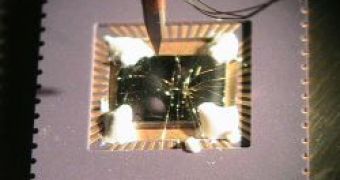University of Michigan researchers announced the first step towards achieving a quantum computer, the first scalable quantum chip.
Using the same semiconductor fabrication technology that is used in everyday computer chips, researchers were able to trap a single atom within an integrated semiconductor chip and control it using electrical signals.
"The semiconductor chip we demonstrated holds an individual atom in free space inside the chip; we levitate the atom in the chip by applying certain electrical signals to the tiny nearby electrodes. We directly view this single atom with specially-tuned lasers and a sensitive camera. This type of ion trap has never been demonstrated at such a small level and in an integrated chip structure," Christopher Monroe, University of Michigan and study co-author said.
The chip designed and manufactured by the US researchers is about as big as a postage stamp and is fitted with electrodes connected to different voltages, which are used to control the ion by moving it in different ways.
Quantum computers are promising because they can solve certain problems much faster than any possible conventional computer, owing to the bizarre features of quantum mechanics.
For instance, quantum computers can process multiple inputs at the same time in the same device, and quantum circuitry can be wired via the quantum feature of entanglement, dubbed by Einstein as "spooky action-at-a-distance."
One of the most favored candidate quantum computer architectures is the use of individual atoms to store quantum bits (qubits) of information, where each qubit can hold the number 1 or 0, or even both 1 and 0 simultaneously
Electrically charged atoms (ions) for such quantum computers are stored in what are known as ion traps.
Apparently, researchers know how to program a quantum computer composed of any number of trapped ions; the problem is to get the ions trapped.
For this reason, efforts in the area of quantum computing are now focused on making ion traps on a chip that are scalable and mass producible, and can host larger numbers of qubits.

 14 DAY TRIAL //
14 DAY TRIAL //